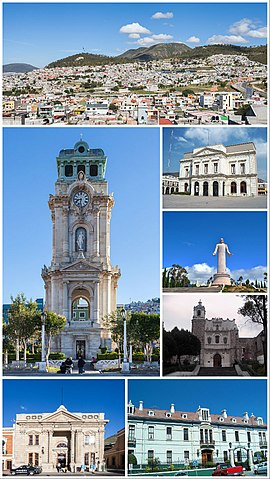
Back Pachuca de Soto Afrikaans Pachuca de Soto AN Pachuca de Soto ANG باتشوكا Arabic Pachuca de Soto AST Pachuca de Soto Aymara Pachuca de Soto BAR Пачука Bulgarian Pachuca de Soto Breton Pachuca de Soto Catalan
You can help expand this article with text translated from the corresponding article in Spanish. (December 2013) Click [show] for important translation instructions.
|
Pachuca
Nju̱nthe (Mezquital Otomi) | |
|---|---|
City and Municipality | |
 Left:Panorama view of Pachuca, including Lobo Hills, Los Chavez, from Cubitos Ecological Park, Pachuca Monument Clock Tower, Pachuca Bancomer heritage building, Right:Medina Hidalgo Bartolomé Teather (Teatro Hidalgo Bartolomé de Medina), Christ King of achuca (Cristo Ray de Pachuca), Pachuca Saint Francis of Assisi Monastery, Pachuca Municipal Palace (Palacio Municipal de Pachuca) | |
| Nickname: La Bella Airosa (The Windy Beauty) | |
 Location of Pachuca Municipality within Hidalgo | |
| Coordinates: 20°6′N 98°45′W / 20.100°N 98.750°W | |
| Country | |
| State | |
| Municipality | |
| Government | |
| • Type | Ayuntamiento |
| • Mayor or Municipal President | Yolanda Tellería Beltrán (PAN) |
| Elevation | 2,432 m (7,979 ft) |
| Population (2015) Municipality | |
| • Total | 277,375 |
| • Seat | 256,584 |
| Time zone | UTC−6 (CST) |
| • Summer (DST) | UTC−5 (CDT) |
| Website | www.pachuca.gob.mx |
Pachuca (Spanish pronunciation: [paˈtʃuka] ; Mezquital Otomi: Nju̱nthe), formally known as Pachuca de Soto, is the capital and largest city of the east-central Mexican state of Hidalgo, located in the south-central part of the state. Pachuca de Soto is also the name of the municipality for which the city serves as municipal seat. Pachuca is located about 90 kilometres (56 mi) north of Mexico City via Mexican Federal Highway 85.[1]
There is no agreed upon consensus regarding the origins of the word pachuca. It has been loosely traced to pachoa ('strait', 'opening'), pachoacan ('place of government', 'place of silver and gold') and patlachuican ('place of factories', 'place of tears').[2]
The official name of Pachuca is Pachuca de Soto in honor of congressman Manuel Fernando Soto, who is credited with the founding of Hidalgo state.[3] Its nickname of La Bella Airosa ("the airy, beautiful") comes from the strong winds that blow through the canyons to the north of the city.[2] In the indigenous Otomi language, Pachuca is known as Nju̱nthe.[4] The area had been long-inhabited; apart from some green obsidian, the mining that Pachuca is most famous for began in the mid-16th century, during Spanish colonial rule.
Pachuca remained a major mining center until the mid-20th century, with the city's fortunes fluctuating with the health of the mining sector. In the mid-20th century, a major downturn in mining pushed the city to shift focus from mining to industry, resulting in the revamping of the Universidad Autónoma de Hidalgo. Today, mining forms only a fraction of the municipality's economy.[2][5] One cultural aspect that makes Pachuca unique is the influence of the Cornish miners who immigrated in the 19th century from Great Britain, as many of their descendants remain in Pachuca, and nearby Real del Monte. Furthermore, the Cornish populace helped to shape two local traditions that define the city—fútbol and a dish called "pastes."[6]
- ^ Aldama, Antonio. "Tips viajero Pachuca (Hidalgo)" [Travelers tips Pachuca (Hidalgo)] (in Spanish). Mexico City: Mexico Desconocido. Archived from the original on 2009-04-16. Retrieved 2009-10-08.
- ^ a b c "Estado de Hidalgo Pachuca de Soto" (in Spanish). Enciclopedia de los Municipios de México. Archived from the original on 2011-05-17. Retrieved 2009-10-08.
- ^ "Donde ir en Pachuca, Hidalgo" [Where to go in Pachuca, Hidalgo] (in Spanish). Archived from the original on 2011-12-03. Retrieved 2009-10-08.
- ^ "Diccionario del hñähñu (otomí): Valle del Mezquital, Hidalgo" (PDF) (in Spanish and Otomi). Summer Institute of Linguistics. Archived from the original (PDF) on 2014-01-09. Retrieved 2013-11-18.
{{cite web}}: CS1 maint: unrecognized language (link) - ^ "Fundación, historia y desarrollo de Pachuca" [The founding, history and development of Pachuca] (in Spanish). Mexico City: El Clima. Retrieved 2009-10-08.
- ^ "The Cornish Heritage in Mexico Today". Sociedad Cultural Cornish Mexicana. Archived from the original on 2009-06-06. Retrieved 2009-10-08.
© MMXXIII Rich X Search. We shall prevail. All rights reserved. Rich X Search


